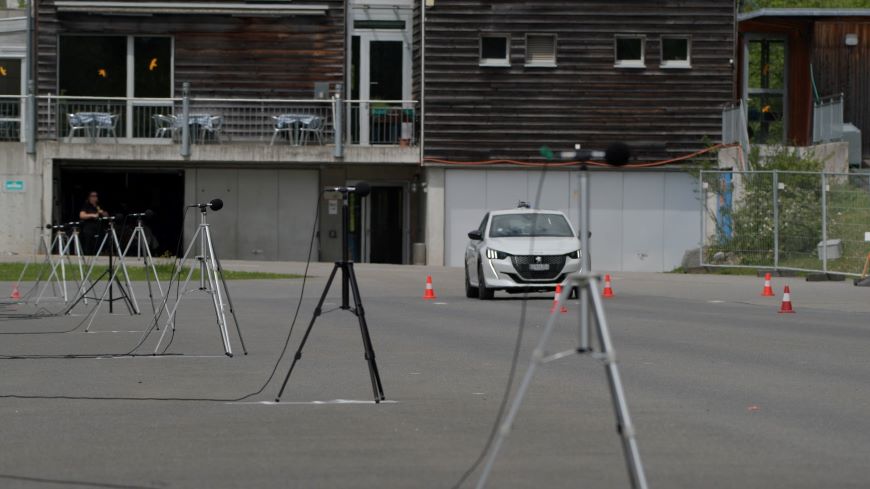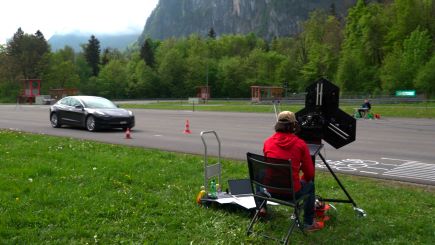Difference in noise levels between e-cars and combustion vehicles
Electric cars stay atop in noise duel at traffic lights
Empa and the Touring Club Switzerland (TCS) have, for the first time, conducted a joint research project. The study set out to investigate how the noise levels of electric cars and cars with combustion engines differ. While hardly any differences can be detected at constant speed, e-cars are significantly quieter when accelerating.

If more and more electric vehicles are on our roads, this will not only have a positive impact on the climate and air quality, but also on traffic noise. The extent to which the noise levels of electric vehicles and cars with combustion engines differ has not yet been systematically investigated. Empa and TCS have carried out an extensive research project in close cooperation to find out how the noise levels of comparable cars with different drive systems differ depending on the driving style.
Nine pairs of cars in direct comparison

At the TCS Stockental driving center, Empa and TCS compared nine pairs of cars from different categories – from the Peugeot (e)-208 to the VW ID.Buzz and its combustion counterpart, the VW Multivan. The experts took various acoustic measurements on the roughly 100-meter test track and examined the noise levels at constant speed and during acceleration. For this purpose, Empa researchers developed new sensor modules that were mounted on the test vehicles and enabled the test drivers to complete various driving profiles precisely and repeatably.
Major differences during acceleration
The team found that electric cars are significantly quieter than their combustion engine counterparts, particularly when accelerating. Especially when accelerating below 40 kilometers per hour, for instance, when starting at traffic lights, the noise levels of electric cars are significantly lower on average. Depending on the pair of cars, the difference is more than three decibels, which corresponds to a halving of the sound intensity. The difference between the drive types increases significantly with increasing acceleration: The greater the acceleration and the lower the speed, the louder the combustion engine is compared to the electric car.
The results were different, however, when driving at constant speeds of between 30 and 60 kilometers per hour, i.e. at typical inner-city speed: There were no significant noise differences on average between electric cars and cars with combustion engines, as tire noise dominates and drowns out the engine noise.
Successful collaboration between Empa and TCS
For Sascha Grunder, Head of Test & Technology at TCS, the study revealed important findings: "With this detailed study, we have broken new ground and have shown that electric cars are quieter than combustion engines, especially at low speeds and high acceleration. For TCS, it was a privilege to work together with Empa's scientists and provide the Empa acoustics lab with real data for the first time."
Reto Pieren from Empa's Acoustics/Noise Control lab agrees: "The results are an important contribution to noise research and show that e-mobility contributes to noise reduction in urban environments. The collaboration with TCS was enriching, and I look forward to continuing it."
The results of the study will be presented at the international scientific conference Forum Acusticum in Malaga. The study also forms the basis for further research projects. The researchers will continue to evaluate and analyze the measurement data until the end of 2025. In a next step, Empa and TCS want to jointly investigate the influence of the tire type and the road surface properties on the noise level. These investigations will take place in spring 2026, and the results are expected to be published at the end of next year.
Dr. Reto Pieren
Laboratory for Acoustics / Noise Control
Phone +41 58 765 60 31
-
Share






